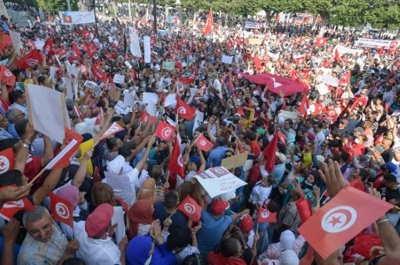
Thousands of Tunisians protested against President Kais Saied’s seizure of almost total power protested in the capital on Sunday as the growing numbers taking to the street in recent weeks has raised the risk of the political crisis unleashing unrest.
A week after thousands demonstrated in support of President Saied, the growing numbers raise the possibility of Tunisia’s political divisions spiraling into street confrontations between rival camps.
“We will not accept the coup. Enough is enough,” said Yassin ben Amor, a protester.
A very heavy police presence stopped any march down Habib Bourguiba Avenue in central Tunis, but despite some protesters throwing plastic bottles there were no clashes.
Interior Ministry spokesman Khaled Hayouni said the police would deal with protesters from both sides in the same way. “The Tunisian police is a republican police and it does not intervene in any political side,” he said.
President Saied dismissed the prime minister, suspended parliament and assumed executive authority in July in moves his foes call a coup. Last month he brushed aside much of the constitution, which he said he would appoint a committee to amend, adding that he could rule by decree.
His intervention appeared popular after years of economic stagnation and political paralysis, but it has cast into doubt the democratic gains made by Tunisians during a 2011 revolution that triggered the Arab Spring uprisings.
“We are against the coup… We reject the speech of division,” said Jaouhar Ben Mbarek, a prominent activist and main organiser of protests against President Saied, saying they must be loyal to those killed in the 2011 revolution.
President Saied has appointed Najla Bouden Romdhane as Prime Minister, but she has not yet named a government, an important precursor to any efforts to resolve Tunisia’s looming crisis in public finances, though President Saied said on Saturday she would do so soon.
President Saied said he would initiate a dialogue with Tunisians over the future during a meeting on Saturday with interim Interior Minister, Ridha Gharsalaoui.
Any dialogue that does not include major political parties or other established elements of civil society, such as the powerful labour union, would likely prompt more open opposition to his moves.
Western donors, needed to avert a collapse in Tunisia’s public finances, have called for an inclusive process to end the crisis period, along with a clear timeline. -Reuters






